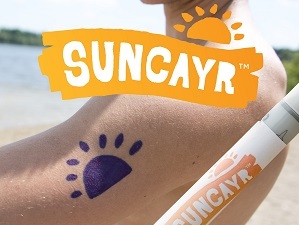Suncayr CEO Rachel Pautler sums it up best when it comes to the obvious appeal of her company’s skin protection product, joking that her team initially wondered, “Why has no one done this before?”
The product—a marker that tests the effectiveness of your sunscreen using ink that only becomes visible when your skin is exposed to UV rays— has a literal pain point, allowing users to avoid sunburns and skin damage. Pautler says it is also more precise than competing products like the Netatmo June wristband and Goodlux Sunsprite lapel clasp, which measure the overall amount of UV exposure received, but cannot gauge sunscreen coverage.
Pautler and fellow co-founders Derek Jouppi, Andrew Martinko and Chad Sweeting are nanotechnology engineers who began working on the idea as a senior class project at the University of Waterloo in 2013. Development started in Waterloo’s Velocity Science accelerator program before half the operation moved to the Velocity Foundry, a hardware incubator. It has also received mentorship at Communitech.
In the span of about two years, Suncayr’s innovative technology has already started turning heads internationally. In 2014, the company was the only Canadian team shortlisted for the prestigious James Dyson Award. Most recently, Suncayr was named one of the Kairos Society’s K50 companies, an international network that spotlights companies that have founders under 25 and a revolutionary, market-ready product.
At the K50 Global Summit held this month in Hollywood, Suncayr was selected out of the group as one of the most promising 13 startups, receiving a resource prize from the NASDAQ Entrepreneurial Center which includes a week of retail space in San Francisco for consumer testing.
Pautler says that while getting the Suncayr marker to market is their chief focus, the medical implications of their technology reach far further.
“Our core technology is not really the UV sensing at all,” she said. “It’s more so how we keep it on the skin. Sun screen has a lot of solvents-- it dissolves a lot of things-- so we developed our technology to keep a very thin film on the top of your skin.”
Future applications of their technology, Pautler says, could include better skin-contact drug delivery for things like nicotine or birth control, and use as an alternative to surgical tape.
“We’re hoping to build out the company to a whole suite of skincare products.”
For now, the Suncayr marker is still in the process of going through Health Canada’s regulation process. Once the company gets the greenlight they will be able to start pre-sales this spring, in anticipation of a full launch in to the Canadian market by July. Pautler says the company’s first round of funding could occur as early as this December.










